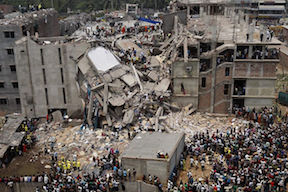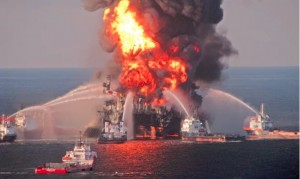The Root Cause Of Irresponsibility. And How To Fix It.
Over the past few weeks, I have written on various aspects of responsibility, including accountability and commitment. I find most people try to make responsible decision, most of the time.
This is also true in business.
So when we find business leaders making irresponsible decisions, we wonder what caused this lapse in good judgment. But when we can encounter irresponsibility on a significantly larger scale, then we really have to question the root cause.
Just consider these atrocious examples:
 The 2013 Savar building collapse in Dhaka, Bangladesh, where 1,129 garment workers died, and 2,500 others were injured. Despite warnings of serious cracks in the building the day before, the building owner, Sohel Rana, claimed the building was safe, and business owners ordered garment workers to return the following day or risk losing a month’s wages. The building then collapsed during the morning rush hour. It is considered the deadliest garment-factory accident in history, as well as the deadliest accidental structural failure in modern human history. In June 2015, murder charges were filed by local police against 42 different people, including the owners of the building, over the collapse.
The 2013 Savar building collapse in Dhaka, Bangladesh, where 1,129 garment workers died, and 2,500 others were injured. Despite warnings of serious cracks in the building the day before, the building owner, Sohel Rana, claimed the building was safe, and business owners ordered garment workers to return the following day or risk losing a month’s wages. The building then collapsed during the morning rush hour. It is considered the deadliest garment-factory accident in history, as well as the deadliest accidental structural failure in modern human history. In June 2015, murder charges were filed by local police against 42 different people, including the owners of the building, over the collapse.- The 2010 Deepwater Horizon oil spill that took almost 5 months to stop, where 210 million gallons of oil spilled into the Gulf of Mexico. In addition to eleven workers who were never found, it is considered the largest accidental marine oil spill in the history of the petroleum industry. In September 2014, a U.S. District Court judge ruled that BP was primarily responsible for the oil spill because of its gross negligence and reckless conduct (the others involved were Transocean, and Halliburton). In July 2015, BP agreed to pay $18.7 billion in fines, the largest corporate settlement in U.S. history.
- The 1984 Bhopal disaster where over 500,000 people were exposed to a deadly gas leak at the Union Carbide factory in Bhopal. This is considered the world’s worst industrial disaster, with an immediate death toll of 2,259 and an estimated 8,000 that died within two weeks. Another 8,000 have since died from gas-related diseases. In June 2010, seven ex-employees, including the former chairman of Union Carbide India Limited, were convicted in Bhopal of causing death by negligence.
A building owner in Bangladesh, the leaders of a chemical company in India, and U.S business leaders from one of the largest oil companies in the world all have something in common.
But it’s not what you think it is.
Profit Over People?
Popular folklore suggests that such atrocities occur because evil business leaders are driven purely by profit and have no regard for the welfare of people. Is this true? Well, there may be a few leaders on the planet that fit this despicable description, but most do not.
Consider the irresponsible decisions and behavior of the average adult, parent, and citizen.
- Why does a responsible adult choose to drive their car after having a few drinks, accidently killing an innocent person on their way home?
- Why does a responsible parent temporarily leave their child in a locked car on a hot day, to die from heat exhaustion?
- Why does a responsible citizen join a violent demonstration, hurling rocks at police, smashing windows and setting vehicles aflame?
None of these irresponsible actions are related to profit, nor are they a sign of total disregard for fellow human beings.
The problem is deeper, and much simpler.
The Root Cause of Irresponsibility
On the surface, it appears fear caused the owners of the building in Dhaka, Bangladesh to say that everything was safe, in spite of the sudden appearance of large cracks. This makes sense since dozens of business and over 5,000 people relied on this building to earn their livelihood.
 On the surface, it appears fear caused the leaders at BP (as well as Transocean and Halliburton) to ignore safety warnings in the hours before the Deepwater explosion. This makes sense for a multi-billion dollar operation that employed thousands of people around the world.
On the surface, it appears fear caused the leaders at BP (as well as Transocean and Halliburton) to ignore safety warnings in the hours before the Deepwater explosion. This makes sense for a multi-billion dollar operation that employed thousands of people around the world.
On the surface, it appears fear caused Union Carbide (now owned by Dow Chemical Co.) to claim that the Bhopal disaster was the result of sabotage (someone purposefully put water into a tank that started the runaway exothermic reaction), even though several safety systems were clearly inoperable due to poor maintenance, and various safety systems had been switched off to save money.
Fear often appears to be the primary cause of irresponsible decisions. But it’s not the root cause.
The root cause of irresponsibility is hubris.
Hubris occurs when there is excessive pride or self-confidence. It occurs when leaders think they know better. When managers ignore clear warning signs and claim their experience trumps the obvious, hubris has taken over.
Hubris is dangerous.
Hubris can be fatal – for everyone.
The Antidote
Thankfully, there is a simple antidote to hubris. It’s humility.
Humility may not seem very sexy or business leader-like. But it’s a powerful quality that the best leaders possess, as researcher and author Jim Collins noted in his book Good To Great.
Regardless of your years of experience, length of tenure, position, title, or personal brilliance, you can expand your humility by practicing these five things:
- Confront prejudices. Know your own biases and strive to keep an open mind.
- Ask questions. Show that you don’t know everything by allowing others to participate.
- Really listen. Learn how to listen well through practice, patience, and perseverance.
- Accept setbacks. Learn to accept that setbacks happen, but they’re not the end of the world.
- Be grateful. Appreciate all those around you, and realize it’s not about you.
Bottom Line: The best way to avoid making irresponsible decisions is to fight off hubris and embrace the power of humility. It will not only help you make more responsible decisions, you’ll also avoid creating the next tragic news item.
—————————–
Are you at risk of making a seriously irresponsible decision?









